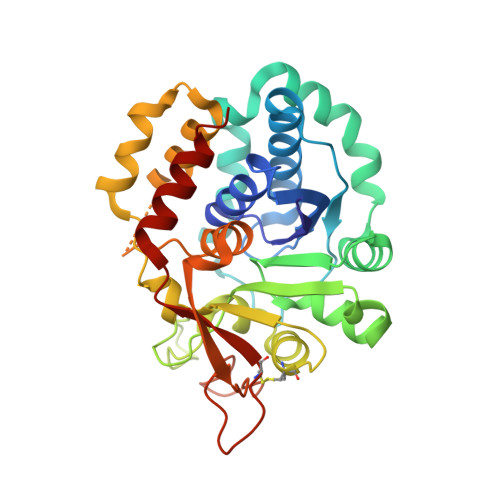Structures of purine nucleosidase from Trypanosoma brucei bound to isozyme-specific trypanocidals and a novel metalorganic inhibitor
Giannese, F., Berg, M., Van der Veken, P., Castagna, V., Tornaghi, P., Augustyns, K., Degano, M.(2013) Acta Crystallogr D Biol Crystallogr 69: 1553-1566
- PubMed: 23897478
- DOI: https://doi.org/10.1107/S0907444913010792
- Primary Citation of Related Structures:
4I70, 4I71, 4I72, 4I73, 4I74, 4I75 - PubMed Abstract:
Sleeping sickness is a deadly disease that primarily affects sub-Saharan Africa and is caused by protozoan parasites of the Trypanosoma genus. Trypanosomes are purine auxotrophs and their uptake pathway has long been appreciated as an attractive target for drug design. Recently, one tight-binding competitive inhibitor of the trypanosomal purine-specific nucleoside hydrolase (IAGNH) showed remarkable trypanocidal activity in a murine model of infection. Here, the enzymatic characterization of T. brucei brucei IAGNH is presented, together with its high-resolution structures in the unliganded form and in complexes with different inhibitors, including the trypanocidal compound UAMC-00363. A description of the crucial contacts that account for the high-affinity inhibition of IAGNH by iminoribitol-based compounds is provided and the molecular mechanism underlying the conformational change necessary for enzymatic catalysis is identified. It is demonstrated for the first time that metalorganic complexes can compete for binding at the active site of nucleoside hydrolase enzymes, mimicking the positively charged transition state of the enzymatic reaction. Moreover, we show that divalent metal ions can act as noncompetitive IAGNH inhibitors, stabilizing a nonproductive conformation of the catalytic loop. These results open a path for rational improvement of the potency and the selectivity of existing compounds and suggest new scaffolds that may be used as blueprints for the design of novel antitrypanosomal compounds.
Organizational Affiliation:
Biocrystallography Unit, Department of Immunology, Transplantation and Infectious Diseases, Scientific Institute San Raffaele, via Olgettina 58, 20132 Milano, Italy.















